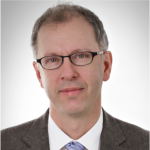 |
Dr. Volker Arndt Cancer Registry Baden-Württemberg, Germany |
Motivation for standing for election
Comparability, timeliness, and usefulness represent the cornerstones for successful and sustainable cancer registration. Population-based cancer registries have a long-standing and highly acknowledged role in cancer monitoring on regional, national, and international level. This has been achieved by various efforts to ensure data comparability, harmonization of data coding and processing. Currently, cancer registration is increasingly heading towards population-based collection of detailed clinical data. This development will offer new opportunities for health services and outcome research but also represents new challenges in data processing, harmonization of data coding and best-of-generation. Here, we will need a coordinated approach within the European cancer registries.
Another motivation is related to novel technologies (artificial intelligence) and the envisioned European Health Data Space. Both offer great potential for cancer registration and scientific research but will need an harmonized approach across member registries. A further motivation is related to my interest in cancer survivorship. How can we achieve modalities across various countries to integrate comparable information about long-term and late effects after cancer into CR data.
Short CV
Positions:
04/2016-ongoing: Director of Epidemiological Cancer Registry Baden-Württemberg, DKFZ*, Heidelberg (DE)
04/2016-ongoing: Head of Unit of Cancer Survivorship, DKFZ, Heidelberg (DE)
12/2015-03/2016: Acting Director of Epidemiological Cancer Registry Baden-Württemberg, DKFZ, Heidelberg (DE)
04/2014-12/2017: Scientific Director, National Institute for Cancer Epidemiology and Registration, Zürich, (CH)
07/2007-12/2013: Deputy head “Risk structure equalization”, German Federal Social Insurance Authority, Bonn (DE)
01/2006-03/2016: Senior research fellow, Clinical Epidemiology and Aging Research, DKFZ*, Heidelberg (DE)
01/2002-12/2005: Postdoctoral research fellow, Epidemiology, German Centre for Research on Ageing, Heidelberg (DE)
11/1999-12/2001: Postdoctoral research fellow, Institute for Occupational Safety and Health, German Federation of Institutions for Statutory Accident Insurance and Prevention, St. Augustin (DE)
10/1999-11/1999: Head of Cancer Registry Schwaben, Institute for Pathology, Augsburg (DE)
10/1996-09/1999: Postdoctoral research fellow, Department of Epidemiology, University of Ulm (DE)
04/1993-07/1995: Junior Doctor & Research Associate, Institute for Occupational, Social and Environmental Medicine & Unit of Epidemiology, University of Ulm (DE)
Scientific degrees:
05/2023: Associate Professorship”, Medical Faculty Heidelberg, Heidelberg University (DE)
05/2007: Habilitation “Epidemiology”, Medical Faculty Heidelberg, Heidelberg University (DE)
11/1995: MD, University of Tübingen (DE)
Academic degrees :
08/1995-09/1996: Master of Public Health, School of Public Health, Division of Epidemiology, University of North Carolina (UNC) at Chapel Hill (USA)
04/1986-11/1992: Medical degree (state examination), University of Tübingen
